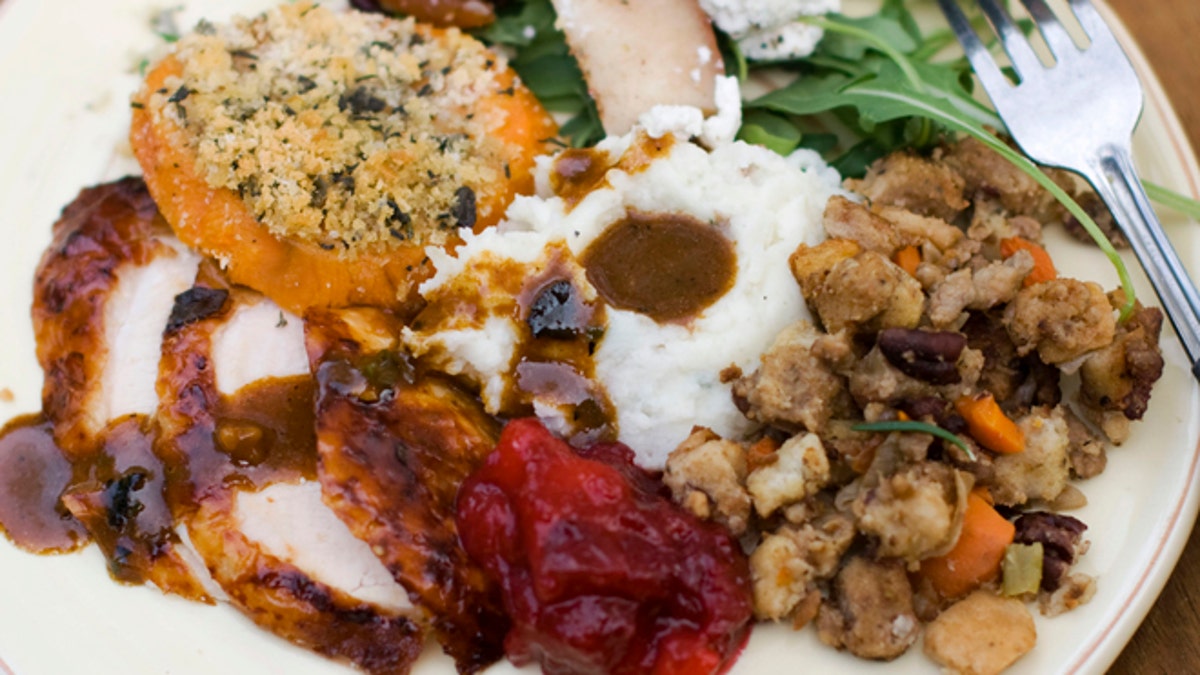
Oct. 8, 2012: A Thanksgiving dinner plate of cider brined turkey with sage gravy, peach cranberry sauce, sour cream and chive mashed potatoes, sausage pecan stuffing, arugula pear salad with pomegranate vinaigrette and goat cheese and herb crusted sweet potatoes. (AP)
If you get stuck with the thought, “I ate too much this holiday, I can’t control my eating,” you may find yourself at risk of a month-long food fest. Studies estimate you may eat 2,000-3,000 calories during your Thanksgiving meal.
This Thanksgiving, I'm telling others to do something different: savor gratitude and skip seconds.
Sound a little too ambiguous? Not so: gratitude is linked to both social and health benefits.
When we overeat and conclude that the process of undoing the damage is too hard and overwhelming, we may feel unable to commit to our health goals, especially in the face of holiday baskets, gingerbread cookies, and eggnog.
This Thanksgiving, relish in the gratitude of others and a sense of personal gratitude in knowing you are someone who can both celebrate and stay healthy.
[pullquote]
My message isn’t to save yourself for your skinny jeans, but to feel a sense of personal pride and accomplishment.
You matter.
Here are 5 tips I give my patients:
1. Know some facts and put down your fork. Brian Wansink, Ph.D., a food researcher at Cornell, studies factors that influence eating. If you eat a meal with one other person, you will eat 35% more; in a group of 4 or more, 75% more; and in a group of 7 or more you will eat 96% more than you’d what you'd eat while dining alone. When we are around people, are attention is divided and we may move away from paying attention to our hunger or our portions. We may also continue eating beyond the point of feeling full: when others around us eat, it feels contagious to continue. Knowing the fact that more company may lead to more consumption may help you slow down.
You can sit and linger and the table enjoying conversation. It is helpful to pause and put your fork down between bites. Often our eating speed is influenced by the rate in which others eat. Trying to keep your own rhythm requires some strategy and practice.
2. Redefine. Take a moment to think about how you define a wonderful Thanksgiving holiday. Is it all about stuffing, or experiencing uncontrollable laughter with family and friends while sharing stories and memories? Thanksgiving is really food-focused. Instead of thinking about turkey, cranberry sauce, yams, stuffing, pumpkin pie baking contests, you may want to spend a moment before the holiday reminding yourself what matters to you.
3. Eat lunch. If you know you are eating big holiday meal, you may eat light throughout the day to save calories and your appetite. Does this actually ever work? Skipping meals leaves you hungry and hunger leads to loss of willpower, according to Roy Baumeister. A leading psychiatrist in the area of binge eating, Dr. Chris Fairburn, states that restricting predicts binging. Rather than skipping meals, eat normal meals throughout the day.
4. Use one plate. It’s hard to remember clearly what you’ve eaten when a new large plate is placed before you after several smaller plates have been removed. There’s something about seeing an empty large plate inviting us to fill it and we may lose sight, literally, of enjoying a meal's worth of appetizers or a full meal when we face an empty dessert plate.
Rather than serving multiple courses, you may elegantly plate your food on a single dish so it is easier to be aware of portions. If you are a guest and aren’t in a position to make suggestions about presentation, bring your attention to your eating. Remember to remember what you eat. We may eat a lot with a little awareness, or really enjoy enough food with enough awareness.
5. Plan ahead beyond recipes. To truly enhance your Thanksgiving, in addition to searching for recipes, think of some ways to add joy, meaning, and connection to your day. Perhaps inviting guests to prepare gratitude stories, large or small, or activities to enhance the spirit of the day, such as games or serving food in shelters or visiting a local retirement home.
